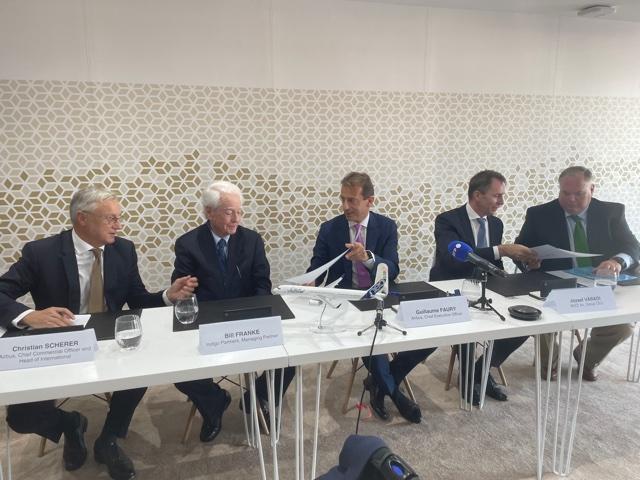
DUBAI—New order announcements for Airbus and Boeing airliners on the third day of the Dubai Airshow underscored the different airshows that the two manufacturers experienced.
Boeing was clearly pleased to bring one of its four 777X test aircraft to an airshow for the first time—and the -9 generated plenty of interest on the static park and in the flying display—while the U.S. airframer also secured a 72-aircraft deal for the 737 MAX-8. But there was no avoiding the fact that Airbus dominated the show when it came to new airliner sales and a sense of renewed industry optimism.
By the end of Nov. 16, the third day of the Dubai Airshow, Airbus had announced four sizeable and strategically significant airliner deals with multiple airlines and leasing companies. They included multi-billion-dollar orders with Indigo Partners for 255 A321 narrowbodies for its four partner LCCs; a letter of intent with Air Lease Corp for 111 aircraft that included narrowbodies and widebodies, and makes the lessor the launch customer for the A350F freighter; and an MoU with Jazeera Airways for up to 33 narrowbodies.
Then came a press conference with Nigerian regional carrier Ibom Air, which announced a firm order for 10 Airbus A220s—a mix of -100s and larger -300s—with deliveries to begin in 2023. Ibom Air CEO Mfon Udom said the state-owned airline wants to expand its network across Africa and is also looking to destinations like Casablanca and Cairo, he said.
Boeing, meanwhile, issued two press releases. The first announced an order from Dar es Salaam-based Air Tanzania for one Boeing 787-7, one 767-300F and two 737MAXs. The order, which Boeing said was valued at more than $726 million at list prices, was previously listed on Boeing’s orders and deliveries site as being from an unidentified customer.
The second announcement was both new and significant—a 72-aircraft order with Indian startup Akasa Air for 737 MAXs, a mix of the -8 and a high capacity -8200 variant. Boeing valued the order at nearly $9 billion at list prices, but there was no press conference and little public fanfare.
Airbus, meanwhile, downplayed any idea that it was chasing sales numbers, but still announced multiple large all-new order deals at the show and was able to negotiate one of them on site. Airbus COO and head of international Christian Scherer pointed out that the Jazeera MoU proved deals could be done at an airshow, while Jazeera CEO Rohit Ramachandran described it as an “opportunistic” airshow deal and joked that he had been “romanced” by Scherer.
At all but one signing ceremony, Scherer, sometimes with Airbus Group CEO Guillaume Faury, was sitting beside the customer CEOs. ALC executive chairman Steve Udvar-Hazy and CEO and president John Plueger joined via video conference. In every case, the customer executives have spoken warmly of their relationship with Airbus, describing it as a “partnership” and with some of the airlines mentioning Airbus’ support through the pandemic crisis. They were photo opportunities that Boeing could not deliver.
The Airbus chalet was reminiscent of airshows in the industry boom years when customers and supplier could celebrate yet another order and exchange jokes and compliments. For Boeing, it was an opportunity to showcase its next new widebody and talk about the status of the three certification programs that it is working. For Airbus, it was more a case of let the good times start rolling again.
